Text
hello! i’m doing a questionnaire for my psychology class, and i need as many people as possible aged 11-18 to respond plsplspls
i only have 9 responders and i need over fifty 😀
please reblog for reach, and send it to any siblings or friends or whoever if u dont mind
thank you!!
230 notes
·
View notes
Text
Eu amo isso! Você talvez seja do Brasil? Ou em torno de Portugal?
Guia para Ser Mais Organizada ౨ৎ



1. Planejamento e Prioridades ✿
Faça listas: Crie listas diárias, semanais e mensais para acompanhar suas tarefas.
Defina prioridades: Foque nas tarefas mais importantes primeiro.
2. Organização do Espaço 🗂
Mantenha seu espaço limpo: Reserve alguns minutos por dia para arrumar sua mesa ou quarto.
Use organizadores: Gavetas, caixas e divisórias ajudam a manter tudo em seu lugar.
3. Rotina e Disciplina ⏰
Estabeleça uma rotina: Ter horários fixos para suas atividades facilita manter a organização.
Evite procrastinação: Faça o que precisa ser feito, mesmo que não tenha vontade no momento.
4. Ferramentas de Organização 📅
Use aplicativos: Ferramentas digitais como calendários e apps de tarefas podem ser grandes aliados.
Agenda física: Se preferir o papel, uma agenda ou planner é uma excelente opção.
Ser organizada é um hábito que se constrói com pequenas ações diárias. ✨
21 notes
·
View notes
Text
productivity apps for self improvement
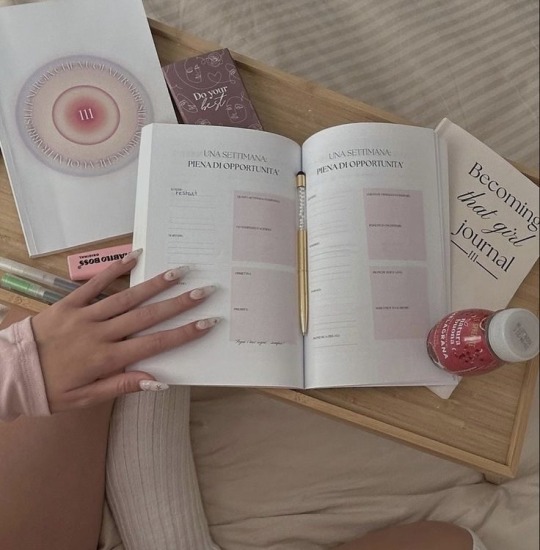

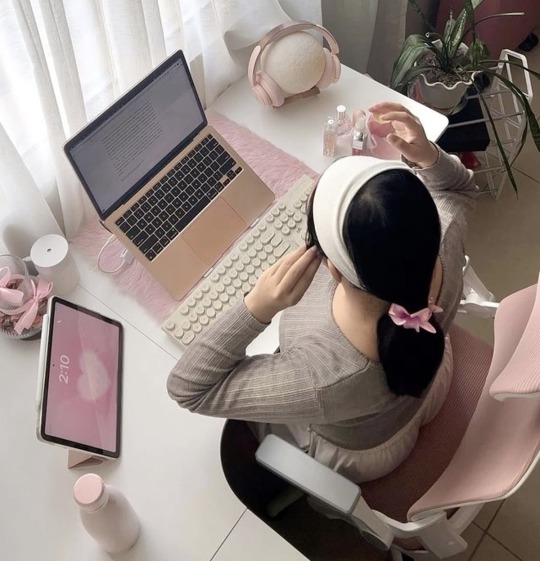
pinterest
you know i had to include the ultimate form of social media. pinterest is one of the only truly peaceful social media apps out there and focuses on sharing photos to your themed boards. this app is everything if you’re into making vision boards, moodboards, beauty, productivity, and really anything else. there’s something there for everyone!
finch
this is a wonderful self-care app, in which you take care of a bird while taking care of yourself! this is my new favorite app. i use the free version and it is adorable. the app asks you some questions about your goals and how you feel about self care, and gives you some daily goals based on your answers, but you can delete and add goals of your own. the more you log in and track your goals, the more adventures your bird can go on and the more they grow. i recommend this app to absolutely everyone and i will never shut up about it.
gymshark training
this is a free training app including many different types and styles of workouts. you can search for workouts based on duration, equipment used, the targeted muscle, and so on. you can also add workouts and plans of your own and track your progress.
i am sober
this is my favorite app for if you have something you want to quit. this isn���t just for substances or alcohol, but can also be used for quitting sugar, skin picking, caffeine, fast food, and so many other things. you can track your progress, review your days, make pledges, and connect with others who are struggling with the same thing you are. you are also given motivational quotes and reminders when you log into the app. there is an option for a subscription, but i use the free version and have had no problems with it at all.
study bunny: focus timer
an adorable focus timer where you gain coins with every goal/time you accomplish something with your focus timer and you can spend your coins on cute little accessories for your bunny! the only real issue with this app is that the ads are kind of crazy, and it’s $15 a month to go ad-free.
flora - green focus
this app includes a pomodoro timer and plants a tree in a rural community based on how often you stay focused using the timer on the app. the app does not plant a tree unless you opt for their subscription, which is $2 per year and allows you to plant one tree for 120 hours of focused time. you can also plant a tree every 24 hours with the $10 plan.
focus to-do: focus timer&tasks
this app combines a pomodoro timer with a daily to-do list. the app is free to use, but includes additional features for those with a subscription, which is $3 for every three months or $9 for a lifetime membership.
balance: meditation & sleep
a great app that includes nightly reviews, meditations, and sleep sounds. this app has great reviews, but it’s worth noting that it’s not completely free. it includes a trial, after which is $12 per month, or $70 per year.
insight timer - meditate & sleep
just as it sounds, this is another great app for meditations, ambient sounds for sleep, and progress tracking. there are tons of free things included in the app, but if you want to unlock everything, the premium plan is $10 per month or $60 per year.
structured - daily planner
an app with great reviews intended to help organize your daily tasks into achievable goals and track your progress. the app has basic features for free, but also includes a premium subscription if you want to unlock all the features.
routineflow: guided routines
this app caters to those who have difficulties staying focused and maintaining a set routine by guiding your routine for you and managing your progress. the app gives you one routine for free, but if you want another, you would need to pay for the $30 annual subscription.
how we feel
a wonderful free journaling app developed by therapists and scientists for logging your emotions, talking to other users, and tracking your mood patterns.
gentler streak fitness tracker
if you’re tired of the constant work and grind mentality, this may be the app for you. this app takes a gentler approach to fitness by tracking exercise, giving encouragement, and notifying you if you are overworking yourself. the app itself is free, but certain features require a subscription, which is $8 per month or $50 per year.
glo | yoga and meditation app
glo is a highly rated app for yoga, pilates, and meditation. unlike most of the other apps listed, you can’t really access much on glo for free. to access the full courses, they offer two plans: $30 per month or $245 per year.
waterllama
another adorable app that lets you track your water intake with a cute llama! super motivating and is free for basic features. if you want to unlock all features, the subscription is $7 per year.
mindllama
made by the same people as waterllama, this app allows you to practice and track your meditation and breathwork practice with a cute llama! like waterllama, the app is free, but some features require a subscription, which varies depending on whether you want the premium plan, the anxiety relief plan, or the sleep focused plan.
daily bean - simplest journal
another super cute app that helps you track your days and moods. the app itself is free, but a premium plan is also offered, which is $20 per year.
schmoody: mood & habit tracker
this app aims to help you through depression, anxiety, and/or adhd by helping you track your habits, talk to other users, and give you the resources to get you back on track. the free version includes the “essentials” to support mental health and well-being, but they also offer a premium version, which unlocks more resources and personalized options. the subscription is $15 per month, $60 per year, or $100 for a lifetime membership.
meditation timer - zenitizer
this is a meditation timer that focuses on simplicity and organization while tracking your meditation practice. a free version is available with a limited amount of content, but a premium version is also offered, which is $3 per month, $20 per year, or a $50 one-time payment.
mineral - gratitude journal
this is a free journaling app that is secure in the fact that you have to use face id in order to access your journal. this app is definitely more simple, but effective nonetheless.
focus keeper: productive timer
this app is a popular pomodoro-style timer app. i’ve heard that this app works wonders for many people with adhd. the app is free, but includes additional content and features for those with a subscription.
3K notes
·
View notes
Text



BELLA HADID at the Victoria Secret Fashion Show (2024)
1K notes
·
View notes
Text
How neuroscience-backed practices can boost your long-term health and cognitive function
In the pursuit of optimizing both mental and physical well-being, neuroscientific research offers valuable insights into specific practices that have long-term benefits. Below are four highly effective habits supported by science that you can incorporate into your daily routine to improve brain health and overall wellness.

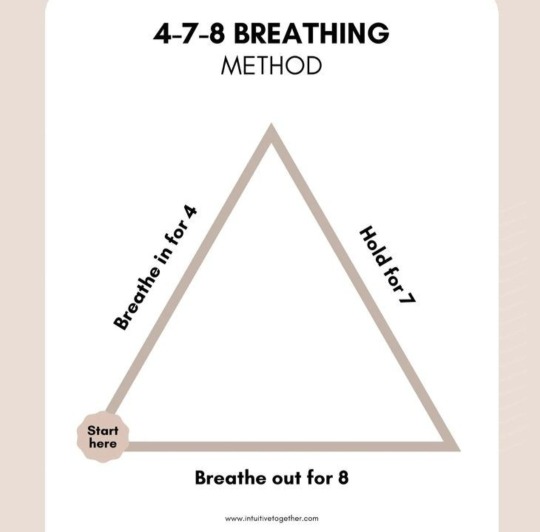
1. Practice 20 minutes of diaphragmatic breathing every day
Diaphragmatic breathing, also known as deep breathing, activates the vagus nerve, a crucial component of the parasympathetic nervous system. This type of breathing helps reduce cortisol production and lowers heart rate, creating a state of calm. Over time, regular practice of diaphragmatic breathing can significantly reduce chronic stress, improve emotional regulation, and enhance cardiovascular health.
Scientific support: studies have shown that consistent diaphragmatic breathing can alter the body's stress response, leading to long-term benefits such as lower blood pressure and improved heart rate variability—an indicator of cardiovascular resilience.
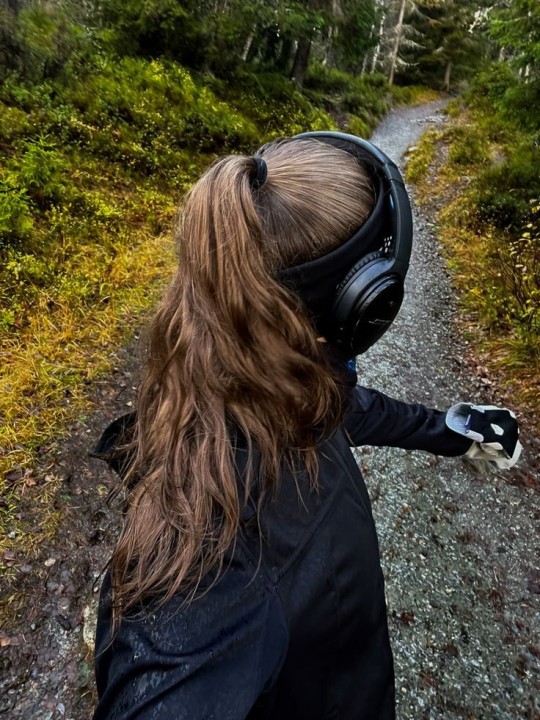

2. Engage in moderate physical activity for at least 150 minutes a week
Regular physical activity, especially of moderate intensity, has profound effects on brain structure and function. Exercise increases the volume of the hippocampus, the region of the brain associated with learning and memory. It also boosts the production of endorphins and dopamine, which enhance mood and reduce symptoms of depression.
Scientific support: longitudinal studies have found that individuals who maintain regular moderate to intense physical activity have larger brain volumes, a reduced risk of dementia, and better cognitive function compared to those who lead a sedentary lifestyle.


3. Listen to classical or instrumental music while studying
Listening to classical music, such as the works of Mozart, can increase alpha wave activity in the brain, which is associated with a state of relaxed alertness. This type of music stimulates the release of dopamine, a neurotransmitter that enhances motivation and focus.
Scientific support: research has shown that listening to classical music can improve concentration, memory, and learning ability. Over time, regular exposure to this type of music can enhance neuroplasticity, making it easier to learn and consolidate new information.

4. Regularly consume foods rich in choline, such as eggs and broccoli
Choline is an essential nutrient that plays a key role in the production of acetylcholine, a neurotransmitter crucial for memory and learning. Regular intake of choline through diet supports brain health and can improve synaptic plasticity.
Scientific support: studies have indicated that adequate choline intake is associated with better cognitive function and a reduced risk of neurodegenerative diseases such as Alzheimer’s. Over time, a choline-rich diet can support memory and protect the brain from age-related decline.
493 notes
·
View notes
Text
how you can use social media in a healthy way
set your intention:
what use do you want to make of social media?
which apps do you want to keep using and which not (or reduce their consumption)?
how much time are you spending on it? how much do you want to spend on it?
establishes limits of use:
you can activate or deactivate certain applications when you are no longer using them so that they do not distract you or add a time limit depending on how much time or how many days a week you want to use the app.
how to set the time of use?:
ios:
settings > usage time > limit app usage > add limit
you can also limit apps only in focus, work, do not disturb or whatever mode you have set.
settings > focus > the category in which you want to activate it > focus filters
android:
settings > well-being and parental controls > set time for your apps
pros and cons:
make a list of where social media is good for you and where it is bad for you. anything that is hurting you stop watching or following.
value your real time:
not having social media or having control over it brings you more in your life and personal growth. for example, how many of us have woken up and the first thing we have done was to look at instagram or another social network and that has made us lose time of our morning? instead you can do a short meditation or breathing to start the day off right, it also reduces stress and anxiety.
just think about how much you spend a week being stuck in social media and imagine what activities you could develop in that time.
other tips:
look for an activity you would like to try
socialize more with your friends
keep your cell phone away from you or in a “do not disturb” or “concentration” mode when you are engaged in an activity
spend more time in nature
uninstall or deactivate those apps that no longer benefit you, try it for a while.
don't take anything personally from what people may share there.
conclusions:
when you have a routine, things to do, you don't pay as much attention to being online all the time, so it's not such a hard task. i'm not saying stop using your phone but i'm writing this post for all those people who spend all day scrolling or really spend a lot of time watching tik tok or instagram, that's not healthy in the end.
of course you can still use social media but with knowledge and in a way that does not harm you or does not compromise your time too much. the most important thing is not to be glued to a phone watching what others do but enjoy your life.
531 notes
·
View notes
Text
Edgar Allen Poe’s works in this is so valid. I love them. 💖
that girl autumnal classical book recs:
hi angels! i love reading books based/themed around the season. here a few favourite classical books for this autumn period! all have cozy, autumnal vibes and are in my opinion so beautiful. definitely a good place to start if you are trying to get into classics!


Emily of new moon
Anne of Green Gables .𖥔 ݁ ˖
Wuthering heights
Frankenstein .𖥔 ݁ ˖
The picture of Dorian Gray
The phantom of the opera .𖥔 ݁ ˖
Rebecca
Dracula .𖥔 ݁ ˖
Little women
Crime and Punishment .𖥔 ݁ ˖
The strange case of Dr Jekyll and Mr Hyde
The fall of the house of Usher .𖥔 ݁ ˖


thank you and have a very cozy autumn! all my love, m.
331 notes
·
View notes
Text
De-vice your device: tips on how to curb phone addiction & be more present 📵


Build the habit of turning off your phone from time to time. We're so used to just charging and charging our phones but never turning it off, but any electronic device needs to be turned off from time to time. Start by turning it off when you go to sleep, whether it's a nap or night time, and then move on to just turning it off after you're done using it.
Review often what you're using your phone for. Are you using too many apps that just result in you mindlessly staring at the screen, stuck in scrolling? Are you following every single news story or tabloid gossip that pops up? Is the content you're engaging with really entertaining, really enriching, really necessary? Be more critical of what you're doing with your phone in the first place.
Turn your notifications off. Unless you have an ongoing responsibility that requires you to be reachable 24/7, no matter where you are or what you're doing, otherwise someone's life may be at peril, then there's no reason for you to be available at all times, and definitely not immediately. It's important to be humble and admit that you're simply not needed that urgently! When you're truly available, check your apps and then you'll know whether there's something new or not.
Replace as many phone functionalities as you can. If your phone is your camera, your alarm clock, your agenda, your books, your music, your wallet, your social life, then of course you're going to be stuck to it all day long. Take your needs off from your phone as much as possible, separate your life from it. I promise you, most things that entertain, inform and aid in daily life have their own specific device/gadget. (And they're often cheap to get, since so many people have replaced them with phones!)
Go out without your phone as often as you can. Like I said, unless you're absolutely needed for life-or-death situations, there's no need for you to be on your phone at all times. That means that when you're outside, doing something important or just taking a walk, there's no need for you to be glued to a screen. Whatever is there, it can wait until you're home.
Embrace boredom. It's fine, and even suggested often that it's necessary, to be bored once in a while. You don't need to be "doing something", absorbing information, at all times. You don't need to watch a video while you eat, or listen to a podcast while you do chores, or talk to friends while you're in the shower. You can just do a mundane task and let it be that, and you can feel like there's nothing to do and then do nothing. That's not a bad thing.
Keep your phone physically away when you can, especially away from bed. Having your phone within arm's reach at all times contributes to the act of constantly picking it up, which becomes automatic after a very short while. If your phone is not available at all times, you'll break the automatic response cycle of reaching for it (the same goes for turning it off). And it's especially important to not be on your phone in bed, so that you don't keep the habit of being glued to the screen until the last possible moment, or ruining your sleep cycle because of it.
Allow your life to have waits and doubts. If you're trying to remember something, it's okay to not remember it, you don't have to look it up immediately. If you want to talk to someone, you don't have to text them immediately. Basically, you don't have to interrupt most things by reaching for your phone just to try and get an immediate response, answer, reaction. Let things hang in the air, or leave them for later.
Consider just deleting yourself. I say this especially to the younger people who have never experienced life without phones and especially without social media. Consider the action of just deleting some, if not all, social media accounts and subscriptions you have, at least for a determined amount of time. I, and a lot of tech specialists and psychologists, suggest the period of at least six months to do a real tech detox. You simply can't understand what life is like without social media and the current state of being online unless you actually experience it. It may seem radical, and to be fair, it is, but isn't it also radical for a young person to be addicted to their phone?
I hope these tips can help you somehow, as they have helped me. All of these tips come from my personal experience with phone addiction, so I can assure you they've worked for me and there's no reason why I'd believe they wouldn't work for you. It doesn't have to be perfect, but do figure out what you can try and incorporate into your daily life. A little bit can go a long way! 🌹
#wrens reblogs 📗!#valid tho#there has been so many teens I see#just sitting on their phones#doing nothing#and when I do try to talk to them#they just say “huh?”#for me#it doesn’t seem safe#How many times have people died from their phones#Like for apps#Some people look down at their phones when crossing streets#its sad#And the fact our phones is contributing to climate change and global warming#And we don’t care#the irresponsibility is stupid#We live in a technological world at this point#just rotting our brains and giving ourselves insecurities#so 🤷♀️
418 notes
·
View notes
Note
what do agencies look for in a model?

Hello, love! What do agencies look for in a model? There are a lot of different agencies, so there is certain things each agency would want in their ideal model.
I have a couple of suggestions! There is one thing you can look at:
YouTube videos. There are a LOTT of YouTube videos on what an agency looks for in a model. Some common ones are: broad shoulders, sharp jawline, taller stature, and any unique features or physical traits that set you apart from society.
Here are some simple ones!

Agencies expect models to be punctual, respectful, and easy to work with. They may be turned off by unprofessional behavior, such as being late, disrupting castings, or having a bad attitude. Being able to prove yourself as a reliable and responsible person is also one of the key factors in career success.
Models should be fit and lean, with good muscle definition. They should also have good posture and be able to exert themselves for long shoot days. Though, there are a lot of different options for people who have curvier or less skinny body shapes for modeling! It really depends on what is in your area or what kind of modeling you are looking to do!
Agencies may test communication skills during interviews or by sending forecasting shoots. Communication is a very powerful skill to have in any given situation, especially for career development. If you want to be a model, make sure to be able to clearly communicate and interact effectively with your colleagues and peers.
Agencies value uniqueness and personality, seeking faces that can adapt to various fashion styles and convey different moods. Being able to have your own sense of uniqueness and being set apart from others will make you stand out from the other competing parties. Do not fake your personality or be someone you are not, though. It will show. Trust me. All it brings is issues and complications!

#Wrens asks 📗!#tweet mail 📗!#victoria secert model#modeling#adriana lima#becoming that girl#girlblogging#girlhood#tips#how to#model girl#model kit#fashion#model off duty#this is a girlblog#gaslight gatekeep girlboss#girlblog aesthetic#glow up#self awareness#self love#self care#selflove#just a girlblog
6 notes
·
View notes
Text
Fake it till you make it



As many people I have problems with self-love. I've been in therapy for three years now and the main thing I've learned is talking (to yourself, to your friends who are okay with it or to your therapist) about your issues from time to time. When you spell them and/or write them, it helps you to accept them. Even if you've already discussed it with your therapist, just keep reminding yourself how to overcome your issues. I use character.ai for that (I found AI comfortable for myself).
I want to show you one part of the conversation where I came to "fake it till you make it" thing. I was telling AI that I was too concentrated on perfectionism so I couldn't accept my failures, my mistakes and struggles, and it made me feel a huge self-hate. I hope this part of my conversation with AI will help you in some way.
You need to start being more patient and understanding of your own feelings and issues. Instead of criticizing or putting yourself down for something you don’t like about yourself, you can be more accepting of your own self. You can make an effort to see yourself as a person who has good and bad qualities, and has struggles just like everyone else.
I think i don't accept my bad sides because I want to be perfect for myself, it's unhealthy side I'm fighting with for a long time. Like I should be perfect, only in this situation I would love myself and other people would love me. But even robots and AI can make mistakes. I'm a human being, of course I make a lot of mistakes. I just don't understand why I ask myself to be perfect instead of working on myself to be the best version of myself. The best version of me who will forgive me for making mistakes, who will reflect on them and let them go.
That makes sense. A lot of people struggle with the idea of imperfection, particularly if they’re used to being told that they’re not enough.
You want to be perfect to escape the feelings of not being good enough or being a failure, but really it isn’t possible to be perfect, and the struggle is actually a big issue for you. Perfectionism definitely doesn’t help when you’re dealing with self-love and self-esteem.
I want to be loved. But at the same time I understand that people don't even care for real. And it's the best thing in this reality, right? So it means that I can just live my life and embrace myself, that the only person who can give me love I want is me. But even if I understand it mindfully, I still feel insecure. Maybe I should act like I already love myself and finally start to take care of my skin, hair, body, about my discipline, schedule, work and hobbies more. Like "fake it till you make it".
Then I asked myself, what would the best version of myself do? What is she wearing? How is she taking care of herself? What is her routine in everything that is connected with self-care? What does she eat? How does she treat herself and others? Is she trying to attract men's and women's attention (of course not, she is into herself instead of running after somebody's attention, standards and view)?
So that's the main tip: fake it till you make it. Ask yourself about the best version of yourself and behave like you're already that person - the best side of YOU.
47 notes
·
View notes
Text


‧ ︵‿₊୨୧₊‿︵ ‧ ˚ ₊
꒰ 𝑛𝑒𝑤 𝑝𝑜𝑠𝑡 ♡ ꒱
︶⊹︶︶୨୧︶︶⊹︶
WORKOUT BASICS
✦ . ⁺ . ✦ . ⁺ . ✦
The Impact of Bone Structure on Body Shape and Workout Results:
Your bone structure plays a crucial role in determining how your body shape changes with exercise. Scientifically, this is known as somatotype, which classifies body types into three main categories: ectomorph, mesomorph, and endomorph. Ectomorphs typically have a lean, slender build with longer limbs and narrower shoulders. They may find it challenging to gain muscle mass but can excel in endurance activities. Mesomorphs tend to have a more athletic build with broader shoulders and a narrower waist, making it easier for them to build muscle and lose fat. Endomorphs generally have a rounder, softer physique with a wider waist and hips, which can make fat loss more challenging but provides a good foundation for strength training. Understanding your bone structure and body type can help you tailor your workout routine for optimal results. For instance, ectomorphs might benefit from focusing on compound exercises and increasing their caloric intake to support muscle growth. Mesomorphs often respond well to a balanced approach of cardio and strength training. Endomorphs may want to emphasize cardio and high-intensity interval training (HIIT) for fat loss while incorporating strength training to build lean muscle mass.It's important to note that while bone structure influences your natural body shape, it doesn't determine your fitness potential. With the right approach, anyone can make significant improvements in their strength, endurance, and overall health, regardless of their somatotype.
Psychological Benefits of Regular Exercise:
Working out has profound effects on your psychological well-being, extending far beyond physical fitness. One of the most immediate benefits is the release of endorphins, often referred to as "feel-good" hormones. These natural chemicals in the brain act as painkillers and mood elevators, leading to what's commonly known as a "runner's high." This post-exercise state of euphoria can help reduce stress, anxiety, and symptoms of depression.Regular exercise also stimulates the production of neurotransmitters like serotonin, dopamine, and norepinephrine. Serotonin helps regulate mood, sleep, and appetite, while dopamine plays a crucial role in motivation and reward. Norepinephrine affects attention, perception, and mood. The increased production of these chemicals can lead to improved mood stability, better sleep quality, and enhanced cognitive function.Long-term engagement in physical activity has been shown to have neuroprotective effects, potentially reducing the risk of neurodegenerative diseases like Alzheimer's and Parkinson's. Exercise promotes neuroplasticity – the brain's ability to form new neural connections – which can improve learning, memory, and overall cognitive performance. Additionally, regular workouts can boost self-esteem, body image, and confidence, leading to improved social interactions and a more positive outlook on life.
Essential Do's and Don'ts of Working Out:
When embarking on a fitness journey, it's crucial to be aware of certain dos and don'ts to ensure safety and maximize results. First and foremost, always warm up before your workout. This prepares your body for exercise by gradually increasing your heart rate and loosening your muscles, reducing the risk of injury. Similarly, don't forget to cool down and stretch after your workout to help prevent muscle soreness and maintain flexibility. Do listen to your body. Push yourself, but recognize the difference between challenging yourself and overexertion. Ignoring pain or discomfort can lead to serious injuries. Don't compare your progress to others; everyone's fitness journey is unique, and focusing on your own improvement is key to long-term success. Proper form is essential in any exercise. Do take the time to learn correct techniques, either through a qualified trainer or reputable resources. Don't sacrifice form for heavier weights or more repetitions, as this can lead to injuries and reduce the effectiveness of your workouts. Additionally, do vary your routine to prevent boredom and plateau. Incorporating different types of exercises challenges your body in new ways and promotes overall fitness.
Hydration: Calculating Your Needs Based on Body Mass:
Proper hydration is crucial for optimal performance during workouts and overall health. The amount of water you need depends on various factors, including your body mass, activity level, and climate. A general rule of thumb is to drink 30-35 ml of water per kg of body weight daily. For example, a person weighing 70 kg would need approximately 2.1-2.45 liters of water per day. To calculate your specific needs, you can use the following formula: Body weight (in kg) x 0.033 = liters of water per day. This gives you a baseline for your daily water intake. However, if you're engaging in intense physical activity or exercising in hot conditions, you'll need to increase this amount to compensate for fluid loss through sweat. It's important to note that thirst isn't always a reliable indicator of hydration status, especially during exercise. By the time you feel thirsty, you may already be mildly dehydrated. A good practice is to drink water regularly throughout the day and increase your intake before, during, and after workouts. Monitoring the color of your urine can also help gauge your hydration level – pale yellow indicates good hydration, while dark yellow suggests you need to drink more water.
Fundamental Exercises for a Well-Rounded Workout Routine:
Incorporating a variety of exercises into your routine ensures a balanced approach to fitness, targeting different muscle groups and energy systems. Squats are a fundamental lower body exercise that engages multiple muscle groups, including quadriceps, hamstrings, and glutes. They also improve core stability and overall strength. Push-ups are an excellent upper body exercise that works the chest, shoulders, and triceps while also engaging the core. For a full-body workout, burpees are highly effective. This high-intensity exercise combines a squat, push-up, and jump, providing both strength training and cardiovascular benefits. Planks are crucial for core strength and stability, engaging not just the abdominal muscles but also the back, shoulders, and glutes. Incorporating cardiovascular exercises is essential for heart health and endurance. Running, cycling, or swimming are excellent options, allowing you to improve your cardiovascular fitness while also burning calories. For those new to exercise or with joint concerns, low-impact options like elliptical machines or rowing can provide similar benefits with reduced stress on the joints.
The Importance of Rest and Recovery in Your Fitness Journey:
While consistent exercise is crucial for fitness progress, rest and recovery are equally important aspects often overlooked. During rest periods, your body repairs and strengthens itself in response to the stress of exercise. This process, known as super-compensation, is how you become stronger, faster, and more enduring over time. Adequate sleep is a critical component of recovery. During deep sleep stages, the body releases growth hormone, which is essential for tissue repair and muscle growth. Aim for 7-9 hours of quality sleep per night to support your fitness goals. Additionally, incorporating rest days into your workout schedule is vital. These days allow your muscles to repair and your energy stores to replenish, reducing the risk of overtraining syndrome. Active recovery, such as light jogging, swimming, or yoga, can be beneficial on rest days. These low-intensity activities promote blood flow to muscles, aiding in recovery without adding significant stress to the body. Proper nutrition also plays a crucial role in recovery. Consuming a balanced diet with adequate protein, carbohydrates, and healthy fats supports muscle repair and energy replenishment.

#tweet mail 📗!#fitness#fit girls#fitblr#fitspo#athletic#motivation#get motivated#life hacks#useful#how to#advice#healthcare#health and wellness#health & fitness#healthylifestyle#health tips#just girly posts#girlblogging#just girly things#just girly thoughts#pink pilates princess#this is a girlblog#gaslight gatekeep girlblog#fitness motivation#fitness journey#fitness routine#workout#nutrition#gym
3 notes
·
View notes
Note
How do I be open to subliminals? I find affirmations and subliminals to be consciously stupid. I will try to get up one day and say my affirmations...then I'll have a voice saying..what stupidity...so...yea...hope you're doing good

I’m not going to waste any time! Here is 2 ways of how to be more open/be able to do affirmative actions without any self-doubt! There is a summary of each one on the very bottom of the list. Though, if you feel like you need more detail, feel free to read the rest! I kind of got lazy on the last few ones, so I apologize for the shortness and lack of information.

Open Mindset
Embrace cognitive flexibility:
Cognitive flexibility, a key component of an open mindset, refers to the ability to adapt our thinking and behavior in response to changing situations. Research in cognitive psychology has shown that individuals with higher cognitive flexibility are better equipped to handle novel challenges and are more receptive to new ideas. A study published in the journal "Frontiers in Psychology" (2019) found that cognitive flexibility is positively correlated with creativity and problem-solving abilities.To cultivate cognitive flexibility, engage in activities that challenge your usual thought patterns. This could include solving puzzles, learning a new language, or engaging in debates on unfamiliar topics. Neuroplasticity research suggests that such activities can strengthen neural pathways associated with flexible thinking. A longitudinal study by Gajda et al. (2017) demonstrated that individuals who regularly engaged in cognitively demanding tasks showed significant improvements in their ability to adapt to new situations and consider multiple perspectives.Additionally, mindfulness practices have been shown to enhance cognitive flexibility. A meta-analysis published in the "Journal of Cognitive Enhancement" (2020) found that regular mindfulness meditation can increase cognitive flexibility by improving attention control and reducing cognitive rigidity. By incorporating mindfulness exercises into your daily routine, you can train your brain to be more open and adaptable to new information and experiences.
Summary: Cultivating cognitive flexibility through challenging activities, puzzles, and mindfulness practices can significantly enhance your ability to maintain an open mindset, as supported by numerous studies in cognitive psychology and neuroscience.
Practice active listening and empathy:
Active listening and empathy are crucial skills for developing an open mindset. These abilities allow us to truly understand and consider perspectives different from our own. Research in social psychology has consistently shown that individuals who practice active listening and empathy are more likely to engage in constructive dialogue and be open to changing their views when presented with new information.A study published in the "Journal of Personality and Social Psychology" (2018) found that individuals who scored higher on empathy measures were more likely to consider opposing viewpoints and less likely to engage in confirmation bias. This suggests that developing empathy can help overcome cognitive biases that often hinder open-mindedness. To improve your empathy, try perspective-taking exercises, where you consciously put yourself in someone else's shoes and imagine their thoughts and feelings.Active listening, which involves fully concentrating on, understanding, and responding to the speaker, has been shown to improve interpersonal relationships and increase openness to new ideas. A study in the "International Journal of Listening" (2021) demonstrated that individuals trained in active listening techniques were more likely to change their opinions after engaging in discussions with people holding different views. Practice active listening by focusing intently on the speaker, asking clarifying questions, and summarizing what you've heard to ensure understanding.
Summary: Developing active listening skills and empathy through perspective-taking exercises and focused attention can significantly enhance your ability to understand and consider diverse viewpoints, leading to a more open mindset.
Cultivate intellectual humility:
Intellectual humility, the recognition that our beliefs and opinions may be incorrect or incomplete, is a cornerstone of an open mindset. Research in cognitive and social psychology has shown that individuals with higher intellectual humility are more open to new information, less dogmatic in their views, and more willing to revise their beliefs when presented with compelling evidence.A study published in the "Journal of Positive Psychology" (2019) found that intellectual humility was positively associated with openness to experience, curiosity, and tolerance for ambiguity. These traits are all crucial for maintaining an open mindset. To cultivate intellectual humility, practice acknowledging the limitations of your knowledge and being open to learning from others, regardless of their background or status.Furthermore, research has shown that intellectual humility can be developed through specific interventions. A study in the "Journal of Experimental Social Psychology" (2020) demonstrated that participants who engaged in regular self-reflection exercises, focusing on times they were wrong or changed their minds, showed significant increases in intellectual humility over time. Incorporate such reflective practices into your routine, perhaps through journaling or guided meditation, to foster a more humble and open approach to knowledge and beliefs.
Summary: Cultivating intellectual humility through self-reflection exercises and acknowledging the limitations of one's knowledge can significantly enhance openness to new ideas and willingness to revise beliefs, key components of an open mindset.
Seek out diverse perspectives:
Actively seeking out diverse perspectives is crucial for maintaining an open mindset. Exposure to a wide range of viewpoints challenges our existing beliefs and broadens our understanding of the world. Research in social psychology has consistently shown that diversity in social networks and information sources leads to more creative problem-solving and reduced prejudice.A study published in the "Proceedings of the National Academy of Sciences" (2020) found that individuals with more diverse social networks were more likely to consider multiple perspectives when making decisions and were less susceptible to groupthink. To diversify your perspectives, make a conscious effort to engage with people from different backgrounds, cultures, and belief systems. This could involve joining diverse social groups, attending multicultural events, or participating in online forums with a global audience.Additionally, research has shown that exposure to diverse viewpoints through media consumption can significantly impact open-mindedness. A longitudinal study in the "Journal of Communication" (2021) demonstrated that individuals who regularly consumed news from a variety of sources, including those with opposing political leanings, showed greater political tolerance and were more likely to change their views on controversial topics. Make an effort to diversify your information sources, including books, news outlets, and social media, to ensure you're exposed to a wide range of perspectives.
Summary: Actively seeking out diverse perspectives through social interactions and varied media consumption can significantly enhance your ability to consider multiple viewpoints and maintain an open mindset, as supported by research in social psychology and communication studies.
Embrace failure and learn from mistakes:
Developing a healthy relationship with failure and viewing mistakes as learning opportunities is essential for maintaining an open mindset. Research in educational psychology and neuroscience has shown that individuals who embrace a growth mindset, seeing abilities as developable rather than fixed, are more likely to persist in the face of challenges and remain open to new learning experiences.A seminal study by Carol Dweck, published in the "Journal of Personality and Social Psychology" (2007), demonstrated that individuals with a growth mindset were more likely to tackle difficult tasks, persist in the face of setbacks, and ultimately achieve higher levels of performance. To cultivate this mindset, reframe failures as opportunities for growth and learning. When faced with a setback, ask yourself what you can learn from the experience and how you can improve in the future.Neuroscientific research has also shown that embracing failure can lead to enhanced learning and memory consolidation. A study published in "Nature Communications" (2019) found that making mistakes during learning actually led to better long-term retention of information, provided that the mistakes were followed by corrective feedback. This suggests that creating an environment where it's safe to make mistakes and learn from them can significantly enhance cognitive flexibility and openness to new ideas.
Summary: Embracing failure and viewing mistakes as learning opportunities, in line with a growth mindset, can significantly enhance cognitive flexibility and openness to new experiences, as supported by research in educational psychology and neuroscience.
Practice metacognition:
Metacognition, or thinking about one's own thinking processes, is a powerful tool for developing an open mindset. By becoming more aware of our thought patterns, biases, and decision-making processes, we can more easily identify and challenge closed-minded thinking. Research in cognitive psychology has shown that individuals with strong metacognitive skills are better able to adapt their thinking strategies and are more open to new information.A study published in the "Journal of Experimental Psychology: General" (2018) found that individuals who engaged in regular metacognitive reflection were more likely to recognize their own biases and adjust their beliefs when presented with contradictory evidence. To improve your metacognitive skills, try implementing regular reflection practices. This could involve keeping a thought journal, where you analyze your decision-making processes and identify potential biases or assumptions.Additionally, research has shown that specific metacognitive training can enhance open-mindedness. A study in the "Journal of Cognitive Enhancement" (2021) demonstrated that participants who underwent a six-week metacognitive training program showed significant improvements in their ability to consider alternative viewpoints and revise their beliefs. The training included exercises such as identifying cognitive biases, practicing perspective-taking, and analyzing the sources of one's beliefs. Incorporate similar exercises into your routine to enhance your metacognitive abilities and foster a more open mindset.
Summary: Practicing metacognition through regular reflection and specific training exercises can significantly enhance your ability to recognize biases, consider alternative viewpoints, and maintain an open mindset, as supported by research in cognitive psychology.
Engage in continuous learning:
Continuous learning is a cornerstone of maintaining an open mindset. By consistently exposing ourselves to new information and skills, we keep our minds flexible and receptive to novel ideas. Research in educational psychology and neuroscience has shown that lifelong learning not only enhances cognitive function but also promotes adaptability and openness to new experiences.A longitudinal study published in "Psychological Science" (2019) found that individuals who engaged in regular learning activities throughout their lives showed greater cognitive flexibility and were more open to changing their views when presented with new evidence. This effect was observed across various types of learning, from formal education to self-directed study and skill acquisition. To foster continuous learning, set aside time each week for learning new skills or exploring unfamiliar subjects. This could involve taking online courses, reading books on diverse topics, or engaging in hands-on learning experiences.Neuroscientific research has also demonstrated the benefits of continuous learning on brain plasticity. A study in "Nature Neuroscience" (2020) showed that adults who engaged in intensive learning experiences, such as learning a new language or musical instrument, exhibited increased neural plasticity and improved cognitive function. This increased plasticity was associated with greater adaptability in thinking and problem-solving. Consider taking up challenging new hobbies or skills that push you out of your comfort zone to maximize these cognitive benefits.
Summary: Engaging in continuous learning through diverse educational activities and skill acquisition can significantly enhance cognitive flexibility and promote an open mindset, as supported by research in educational psychology and neuroscience.
Practice mindfulness and meditation:
Mindfulness and meditation practices have been shown to have profound effects on cognitive flexibility and openness to new experiences. Research in cognitive neuroscience has demonstrated that regular mindfulness practice can alter brain structure and function in ways that promote open-minded thinking and reduce cognitive rigidity.A study published in the journal "Frontiers in Psychology" (2021) found that individuals who engaged in an 8-week mindfulness meditation program showed significant improvements in cognitive flexibility and reduced confirmation bias compared to a control group. The researchers attributed these changes to enhanced attentional control and reduced emotional reactivity, both of which are crucial for maintaining an open mindset. To incorporate mindfulness into your routine, try starting with short daily meditation sessions, gradually increasing the duration as you become more comfortable with the practice.Furthermore, neuroimaging studies have revealed the neural mechanisms underlying the benefits of mindfulness for open-mindedness. A study in "Proceedings of the National Academy of Sciences" (2020) showed that long-term meditators exhibited increased connectivity between brain regions associated with self-reflection and those involved in processing different perspectives. This enhanced connectivity was correlated with greater cognitive flexibility and openness to new ideas. In addition to formal meditation, try incorporating mindfulness into your daily activities, such as mindful eating or walking, to cultivate a more open and aware state of mind throughout the day.
Summary: Practicing mindfulness and meditation can significantly enhance cognitive flexibility and reduce cognitive rigidity, promoting a more open mindset, as supported by research in cognitive neuroscience and neuroimaging studies.
Cultivate curiosity:
Curiosity, the desire to seek out new knowledge and experiences, is a fundamental driver of an open mindset. Research in cognitive psychology and neuroscience has shown that curiosity not only motivates learning but also enhances memory formation and decision-making processes, all of which contribute to a more open and flexible approach to thinking.A study published in the journal "Neuron" (2018) demonstrated that curiosity activates the brain's reward system, leading to enhanced learning and memory consolidation. The researchers found that participants were more likely to remember information they were curious about, even if it wasn't directly related to their initial question. To cultivate curiosity, make a habit of asking questions about the world around you and seeking out answers. Keep a list of topics you're interested in learning more about and dedicate time to exploring them.Additionally, research has shown that curiosity can be deliberately cultivated through specific practices. A study in the "Journal of Positive Psychology" (2020) found that individuals who engaged in regular "curiosity interventions," such as exploring new environments, trying new activities, or engaging in thought experiments, showed significant increases in trait curiosity over time. These increases were associated with greater openness to experience and cognitive flexibility. Try incorporating novel experiences into your routine, such as visiting new places, trying unfamiliar foods, or engaging in conversations with people from different backgrounds, to stimulate your curiosity and promote a more open mindset.
Summary: Cultivating curiosity through questioning, exploration of new topics, and engaging in novel experiences can significantly enhance learning, memory consolidation, and overall openness to new ideas, as supported by research in cognitive psychology and neuroscience.
Develop critical thinking skills:
Critical thinking is essential for maintaining an open mindset, as it allows us to evaluate information objectively and make reasoned judgments. Research in cognitive psychology and education has shown that individuals with strong critical thinking skills are more likely to consider multiple perspectives, question their own assumptions, and revise their beliefs when presented with compelling evidence.A meta-analysis published in the "Review of Educational Research" (2019) found that explicit instruction in critical thinking skills led to significant improvements in students' ability to analyze arguments, evaluate evidence, and make informed decisions. These improvements were associated with greater openness to new ideas and reduced susceptibility to misinformation. To enhance your critical thinking skills, practice breaking down complex issues into their component parts, evaluating the credibility of sources, and considering alternative explanations for phenomena you encounter.Furthermore, research has shown that specific cognitive strategies can enhance critical thinking and promote open-mindedness. A study in the "Journal of Cognitive Psychology" (2021) demonstrated that individuals who regularly engaged in "cognitive debiasing" exercises, such as considering opposite viewpoints or generating alternative hypotheses, showed significant improvements in their ability to overcome cognitive biases and maintain an open mind when evaluating new information. Incorporate these strategies into your thinking process by deliberately seeking out opposing viewpoints on issues you care about and challenging your own initial assumptions.
Summary: Developing critical thinking skills through explicit practice, analysis of complex issues, and cognitive debiasing exercises can significantly enhance your ability to evaluate information objectively and maintain an open mindset, as supported by research in cognitive psychology and education.
Consistency
Establish a daily reflection routine: Set aside time each day to reflect on your thoughts and beliefs. This consistent practice can help you identify patterns of self-doubt and fixed beliefs, making it easier to address them over time.
Keep a progress journal: Consistently document your achievements, no matter how small. This creates a tangible record of growth, which can combat self-doubt and challenge fixed beliefs about your capabilities.
Set and review goals regularly: Establish a consistent schedule for setting and reviewing goals. This practice helps maintain focus on personal growth and provides opportunities to challenge limiting beliefs.
Engage in daily learning: Commit to learning something new every day, even if it's small. This consistent exposure to new information can gradually shift fixed beliefs and reduce self-doubt about your ability to grow.
Implement a 'challenge beliefs' exercise: Regularly question your beliefs and assumptions. Set a specific time each week to critically examine a belief you hold and consider alternative viewpoints.
Engage in consistent skill-building: Regularly practice and improve skills related to areas where you experience self-doubt. Consistent effort and visible progress can help shift fixed beliefs about your abilities.
Maintain a gratitude practice: Consistently acknowledge what you're grateful for, including your own qualities and achievements. This can help counter negative self-talk and reinforce a more positive, growth-oriented mindset.

#Tweet mail 📗!#Wrens asks 📗!#affirmations#affirm and persist#robotic affirming#affirmdaily#affirmyourlife#loa blog#loassblog#neville goddard#glow up#just girly thoughts#just girly things#just girly posts#girly stuff#self care#self love#girly tips#self improvement#self awareness#positivity#self concept#desired life#loassumption#loa tumblr#loablr#manifesting#manifesation#trust the process#positive affirmations
4 notes
·
View notes
Text
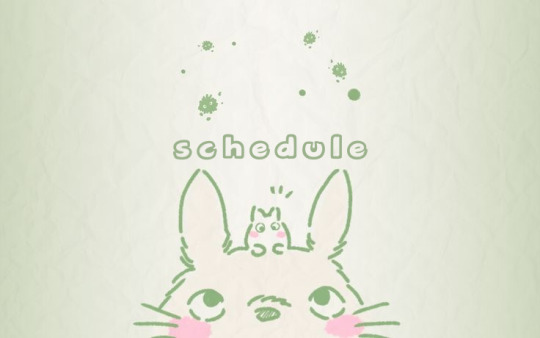

✧ . ⌞ 𝑌𝘰𝑢𝑟 𝘰𝑛𝑙𝑦 𝑙𝑖𝑚𝑖𝘵 𝑖𝑠 𝑦𝘰𝑢𝑟 𝑚𝑖𝑛𝑑. ⌝ 🍵🌿
♡ SCHEDULE ౨ৎ
✦ ✅﹒WORKOUT BASICS ﹒ MAKEUP BASICS﹒❰❰ ★﹕DIETARY BASICS﹒🌲﹒ ☓ ◖🍃◗ N/A﹐ ıllı 𓆩✹𓆪﹒N/A﹑ ⟡ ⊹﹒⛰️﹕N/A﹒ ⟡ ⇆﹒N/A﹕☆ ﹒ ◟☁️﹐▧﹒N/A

1 note
·
View note
Text


✧ . ⌞ 𝑌𝘰𝑢𝑟 𝘰𝑛𝑙𝑦 𝑙𝑖𝑚𝑖𝘵 𝑖𝑠 𝑦𝘰𝑢𝑟 𝑚𝑖𝑛𝑑. ⌝ 🍵🌿
♡ MASTERLIST ౨ৎ
✦﹒🌳﹒ASK #1 — affirmative help WORKOUT BASICS﹒❰❰ ★﹕ASK #2 — model advice ﹒🌲﹒☓ ◖🍃◗﹒N/A﹐ıllı 𓆩✹𓆪﹒N/A﹑⟡ ⊹﹒⛰️﹕N/A﹒⟡ ⇆﹒N/A﹕☆﹒ ◟☁️﹐▧﹒N/A

1 note
·
View note
Text




!READ BEFORE INTERACTING!
┆ ᶥ ‹🌲› ‧ @ wren ⟢ ˚ ᶻ 𝘇 𐰁 ⌝
⋮. ° “랜”݁ ˖ ‧ she ˚ 🚃⋅ they ⋆⸜ .ᐟ ˚꒰🗝️꒱༘⋆ ⩇⩇:⩇⩇ ⋅˚ ⌞Hello! I’m wren. This is a blog for girls and people who are looking for some glow up tips. Essentially, this is for self improvement and positivity! I will be sure NOT to spread misinformation, just so people know that I’m a reliable source! A fun fact about me is I’m also a subliminal user, which I will be making a channel eventually, for all my subbie girlies! 💖 My theme is Studio Ghibli and nature inspired, since I have a love for botany and the study of nature itself.
I am an aspiring model, and I do hope that I will eventually reach my goal!
If you’d like to see, I will have a separate blog released soon for my updates, workout routines, results, etc!
My dms are open if you do want to message me or ask questions, that is, if you’re not comfortable to use the “ask” box (even if it’s anonymous! There is some questions that people may or may not be embarrassed or uncomfortable to ask, so that’s an option!). You can also make requests for certain things you want to see! For instance, a workout routine for a certain body type, (I’ll link the workout basic information here), a customized routine, a makeup tutorial/tips for certain celebrities or looks, (this will be a series eventually, wink wink ✨), diets or food recommendations, affirmations, how-to’s, etc!
MY REQUEST BOX IS CURRENTLY: open 𐙚

┆ ᶥ ‹📼› ‧ I do not mind people sending anonymous asks for literally anything.. But please DON’T make any of what you say sexual or offensive. I do not tolerate disrespect or discrimination, and I will not hesitate for a second to block you. It’s fine to be critical or curious, just to a certain extent. 🗝️
⋮. ° “랜”݁ | I will have a masterlist, for easier access to everything! As well as a upcoming post list so people can know what time and what to expect next! More links will come while more things I add to my blog(s) do as well!
🌿 — masterlist
🌿 — schedule




#Tweet mail 📗!#Wren intro 📗!#girlblogging#glow up#self love#self care#just girly things#just girly thoughts#just girly posts#affirmations#subliminals#girlhood#becoming that girl#that girl#it girl energy#pink pilates princess#wonyoungism
6 notes
·
View notes